More evidence has now emerged suggesting that the Poland-based European Center for Geopolitical Analysis (Europejskie Centrum Analiz Geopolitycznych, ECAG) was an organisation handled by the Russian authorities.
The ECAG was founded in 2007 by a Polish far-right activist Mateusz Piskorski, then a member of the Polish populist party Self-Defence of the Republic of Poland (Samoobrona Rzeczpospolitej Polskiej). The activities of the ECAG were originally limited to providing authoritarian East European regimes with compliant “election observation” missions. (More on this see Chapter 4 in Russia and the Western Far Right) but later would be engaged in other pro-Kremlin efforts.
According to the investigation by the Organized Crime and Corruption Reporting Project, ECAG received €21,000 through Crystalord Ltd., a [Russian] Laundromat company, for “consulting services” in May 2013, despite the fact that Polish law prohibits the organization from carrying out for-profit business activities.
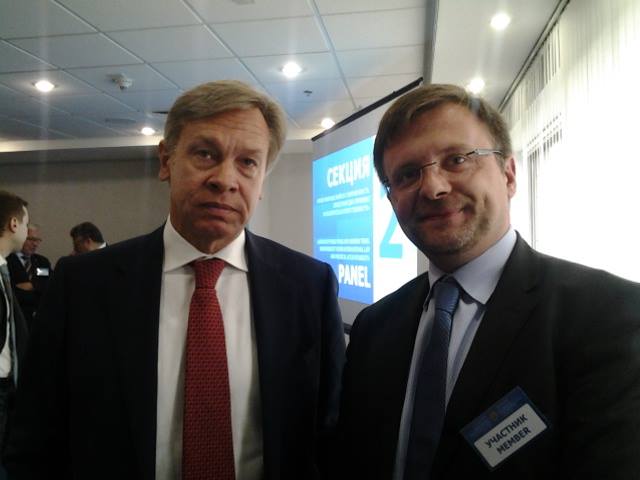
(left to right) Head of State Duma Foreign Affairs Committee Aleksey Pushkov and Mateusz Piskorski at Third International Parliamentary Forum held in Moscow on 26 June 2014
In March 2014, Piskorski co-organised an international “election observation” mission to “monitor” the illegitimate referendum in Ukraine’s Crimea followed by annexation of this Ukrainian territory by Russia. As he brought more than 30 “observers” to Crimea, Piskorski’s task at the “referendum” was, therefore, to demonstrate “international legitimacy” of Moscow’s actions. All these attempts failed because neither the “referendum” nor Russian annexation of Crimea has been recognised by the international community, including the United Nations.
Over the years, Piskorski had several Russian handlers. One of his long-term handlers was Aleksey Martynov, the director of the International Institute of the Newly Established States (IINES) – a Russian structure aiming to advance Moscow’s foreign policy interests by legitimising Russia-occupied territories such as Abkhazia and South Ossetia (Georgia), Transnistria (Moldova), and “Donetsk People’s Republic” and “Lugansk People’s Republic” (Ukraine) as sovereign states.
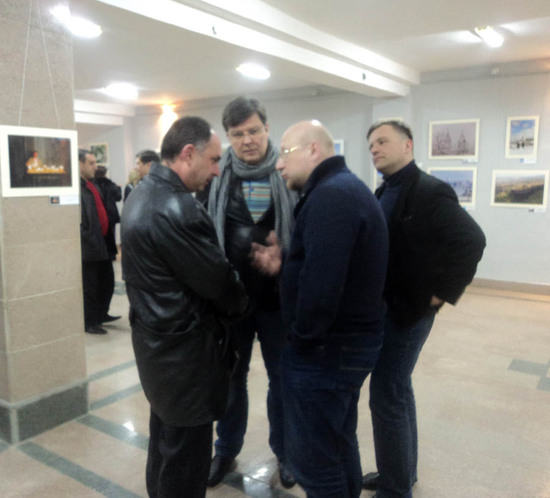
(left to right) Ashot Beglaryan, Aleksey Martynov, Modest Kolerov and Mateusz Piskorski in Nagorno-Karabakh in 2012
In spring 2014, as Russia occupied Crimea and started invading Eastern Ukraine, the Kremlin activated all its experts dealing with the post-Soviet space. At the centre of the Russian anti-Ukrainian strategy at that time was the Kremlin’s then major “political technologist” Vladislav Surkov – almost all Moscow’s high-level infowar activities with regard to Ukraine were either developed or endorsed by Surkov’s team. In March 2014, Martynov was introduced to Surkov’s team by a Kremlin’s political expert Oleg Matveychev, who was one of the organisers of the “international observation” at the “Crimean referendum” the same month. Cooperation with Martynov was personally endorsed, in April-May 2014, by Boris Rapoport, an important representative of Surkov’s team and a member of the Russian Presidential Administration.
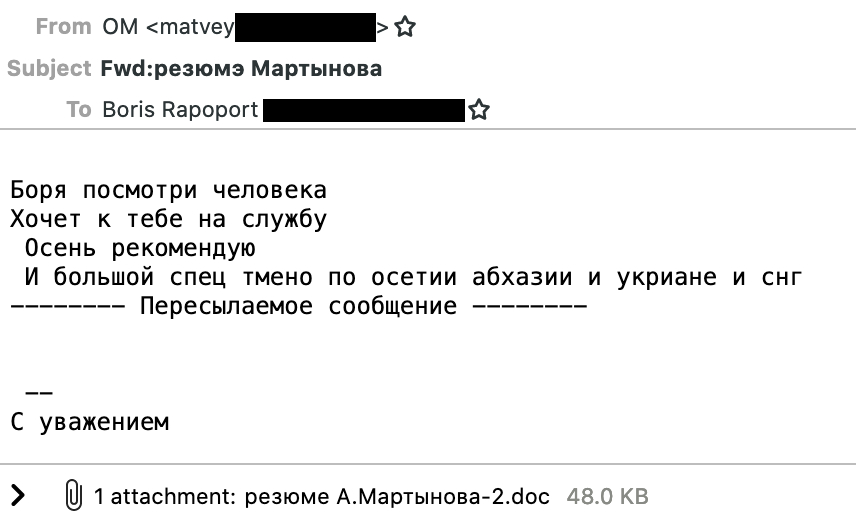
Oleg Matveychev introducing Aleksey Martynov to Boris Rapoport
When he started working with Surkov’s team, one of Martynov’s jobs was organising “international observation” of elections, in which Moscow had its stakes. As Ukraine prepared for the early presidential election in May 2014 (after former President Viktor Yanukovych had fled to Russia), Martynov sent a list of compliant “international observers” to Rapoport saying that they had been registered by Ukraine’s Central Election Commission (true) and that they were ready to go Ukraine and publicly criticise the elections afterwards for a fee of €20 thousand. (Note the decision to condemn the Ukrainian elections even before they actually took place!) The list of those “international observers” was compiled by Piskorski.

Aleksey Martynov sending a list of “international observers” to Boris Rapoport
In another message to Rapoport, Martynov discusses the potential involvement of Polish organisations in the information war against Ukraine. In particular, he mentions the Polish branch of the IINES (“we totally control it”, he writes) and the ECAG. The Polish branch of the IINES was co-founded by ECAG’s member Jacek Cezary Kamiński and Martynov himself.
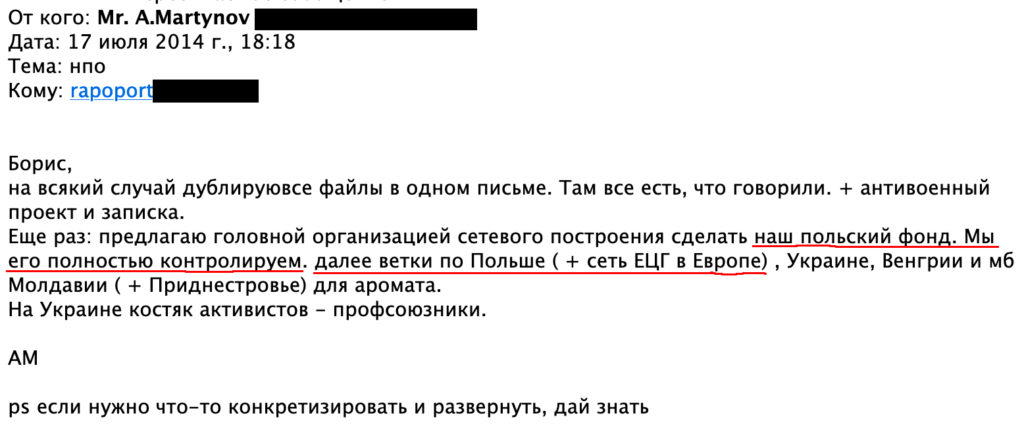
Aleksey Martynov suggesting to involve Polish networks in Russia’s information war against Ukraine
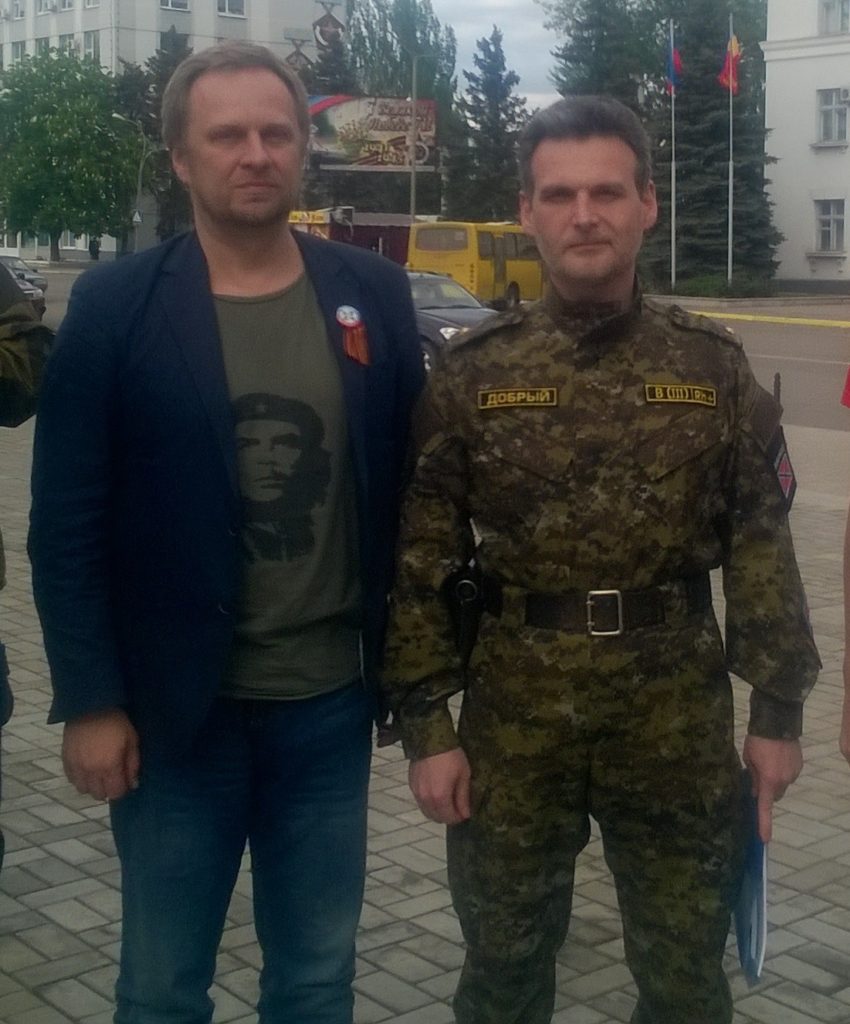
Jacek Kamiński (left) in Russia-occupied Eastern Ukraine together with a pro-Russian fighter